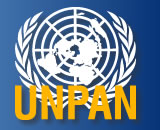| Academic news [3] | Public Policy News [1] |
Regional Seminar for Excellence in Teaching [1]
Events, publications, meetings in the framework of the project
|
22:36 NISPAcee Working Groups in Good Governance, Human Rights and Development | |
 Working Group on Good Governance, Human Rights and Development in Weak, Crisis and Post-conflict States WG Programme Coordinators:Tetyana Malyarenko, Donetsk State University of Management, Donetsk, Ukraine Stefan Wolff, Department of Political Science and International Studies, University of Birmingham, UK Dr David J. Galbreath, University of Bath, Politics, Languages and International Studies, United Kingdom E-mail: d.galbreath@bath.ac.uk NISPAcee Project Manager: Viera Wallnerova, E-mail: wallnerova@nispa.org The newly-established NISPAcee Working Group ‘Working Group on Good Governance, Human Rights and Development in Weak, Crisis and Post-conflict States’ has been officially approved for the 20th Annual Conference of NISPAcee in Ohrid. Call for Paper Proposals 2012 Human rights and development both aim to promote well-being and freedom, based on the inherent dignity and equality of all people. Applying human rights based approach to development will enable governments to enhance the effectiveness of their work through a focus on equality and non-discrimination, accountability, justice, and transparency as the core of human development. Yet, while the implementation of human rights standards and international human rights mechanisms in the decision-making processes at all levels of public governance is generally acknowledged as a priority for public management reforms in weak, crisis and post-conflict states, including in the post-Soviet region, the links between human rights, good governance and economic development, in particular at the local level, and the relationship between human rights and the Millennium Development Goals remain not properly understood and, thus, underexplored. This means that new and important issues, such as state failure or the links between social exclusion, discrimination and poverty are not systematically studied either. Partly, this might be explained with higher priorities by international and national human rights organizations during the first decade of the reforms, who focused their efforts on adoption of human rights standards in the legislation of post-Soviet countries and THE ratification of key international documents, such as the European Convention on Human Rights, European Charter for Regional and Minority Languages, etc. At the same time, there has been growing understanding of the links among human rights, effective governance and economic development whereas issues such as justice, accountability, poverty reduction, employment, social inclusion, non-discrimination, public health, conflict prevention, women and children are fundamental concern of local development. Against this background, the proposed Working Group invites papers in four inter-related thematic areas: (1) in-depth analysis of how human rights frameworks affect conditions for effective governance and economic development in the post-Soviet states; (2) the mechanisms for mainstreaming good governance practices and human rights standards into local development programs; (3) effective policies to realize the potential of good governance for people-oriented economic development; and (4) best practices of research-led teaching on good governance in higher education institutions. The Working Group is open, and indeed welcomes, interdisciplinary and multi-method papers covering a wide range of different approaches from single-sector and cross-sectoral policy analyses to single and comparative case studies. Papers may focus on, among others, public policies and strategies through which human rights strengthen efforts to achieve economic development goals; good governance practices in CEE and the CIS countries, establishing the promotion of justice, accountability and transparency, generating public participation and responding to key challenges for human rights and economic development, such as corruption and violent conflict; or national approaches in different spheres of developments and/or aspects of good governance in terms of the guidance they take from public policy and the role human rights play in policy formulation and implementation. | |
| Category: Academic news | Views: 929 | Added by: Fastriver | |






